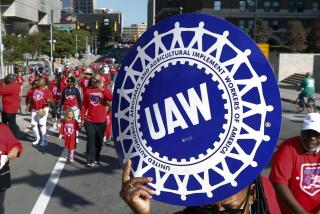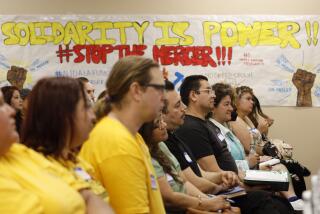Independence of Soviet Unions Called Crucial : Labor: New federation seeks to establish a system that protects workers in a market-oriented economy.
- Share via
MOSCOW — Worried about protecting the rights of labor as the Soviet Union uses market forces to transform its economy, delegates representing 55 million workers met Tuesday to establish an independent trade union system.
“There is great uncertainty about the future,” Igor Y. Klochkov, chairman of the new Federation of Independent Trade Unions of the Russian Republic, told the opening of its second organizational congress. “Only an independent trade union can represent the interests of workers.”
Although he is a top official of the present Soviet labor union hierarchy, Klochkov harshly criticized the country’s existing unions as incapable of representing worker interests. They have been used for too long by the ruling Communist Party to carry out its policies, he said, and, consequently, are not up to the challenge of capitalism.
Klochkov praised the program of radical economic reforms now under debate by the Supreme Soviet, the country’s Legislature, as “an effective instrument to cure our sick economy.”
But he demanded that the government negotiate with his federation about a welfare structure to prevent the exploitation of workers under the new economic system. Ivan S. Silayev, premier of the Russian Republic, last week held a four-hour meeting with the new-style union leaders.
“We are on the eve of very deep changes that will touch all parts of our society,” Klochkov said.
The federation’s main role, organizers said, will be to battle with the government to set a minimum wage, a 40-hour workweek, higher pensions, unemployment compensation and other social welfare programs to create a safety net in the country’s new economic system.
“As we move toward a market system, our No. 1 priority is to protect wage earners,” said Yevgeni V. Arapov, one of the federation’s leaders. “We are in favor of a market system with strict guarantees for decent living standards for those who are not rich.”
Delegates first met in March to try to establish the new federation, with the goal of replacing the All-Union Central Council of Trade Unions, which for nearly seven decades dictated the will of the Communist Party leadership to local trade unions. However, political differences kept the delegates from working out a program in March.
Coal miners, who organized the biggest strikes in Soviet history 14 months ago, are still boycotting the congress.
The miners say the new union resembles too closely the old council, although it, unlike the council, agrees that strikes can be used to fight for workers’ rights and is setting up a strike-support fund. Many of the federation’s leaders held posts in the old council, and some still do; Klochkov is a deputy chairman of the old organization.
“The old leaders of the trade union apparatus cannot ‘restructure’ themselves and start representing the workers at last,” Vladimir A. Filenko, a member of the miners’ strike committee in the Arctic coal fields of Vorkuta, said in a telephone interview. “We do not believe this kind of restructuring is humanly possible. So, we are going to create our own truly independent union.”
Leaders of the new federation, however, defended their ability to turn their backs on the old-style union leadership, which was more concerned with maintaining production quotas than with getting better wages for workers.
“Of course, we can change, just as the Soviet people will have to change,” Arapov said. “The people who lived for 70 years under socialism will now have to learn to live in a capitalist society. We aren’t getting new people from some other planet. The country can’t find all new leaders, either.”
Arapov is the head of public relations and human services for the new federation--the same post he held at the council.
Although organizers of the miners’ labor movement criticized the federation, they conceded that it is a step in the right direction.
“It’s good that there’s at least an alternative to the old trade union organization, which never represented the workers’ needs,” Filenko said.
Yuri A. Bolderev, a leader of the miners’ strike committee in the Donetsk region of the Ukraine, said the new union federation adds yet another player to the power game in the Soviet Union, which was formerly dominated by one player, the Communist Party.
“Now there are many players,” Bolderev said. “The game has become more complicated, and that’s good.”
Nikolai Y. Akritov, the federation’s press spokesman and not a party member, said the new trade union council is a great change.
“Someone who did not belong to the Communist Party could never have held a responsible post in union leadership,” he said. “The fact that I head the press section indicates a huge change.”
The difference between the two organizations, he said, can be compared to a pyramid that used to be upside down, teetering on its tip, but has been righted. The top leadership in the council made all the rules and passed them on to local trade unions. Now, workers and local unions will direct the federation’s leadership to fulfill their demands.
“The All-Union Central Council of Trade Unions was never anything more than a puppet of the Communist Party,” Akritov said. “The federation is an umbrella that will protect us from returning to the command system.”
A flyer advertising the new federation shows it cutting the puppet strings that the Communist Party used to control the labor unions.
More to Read
Sign up for Essential California
The most important California stories and recommendations in your inbox every morning.
You may occasionally receive promotional content from the Los Angeles Times.













